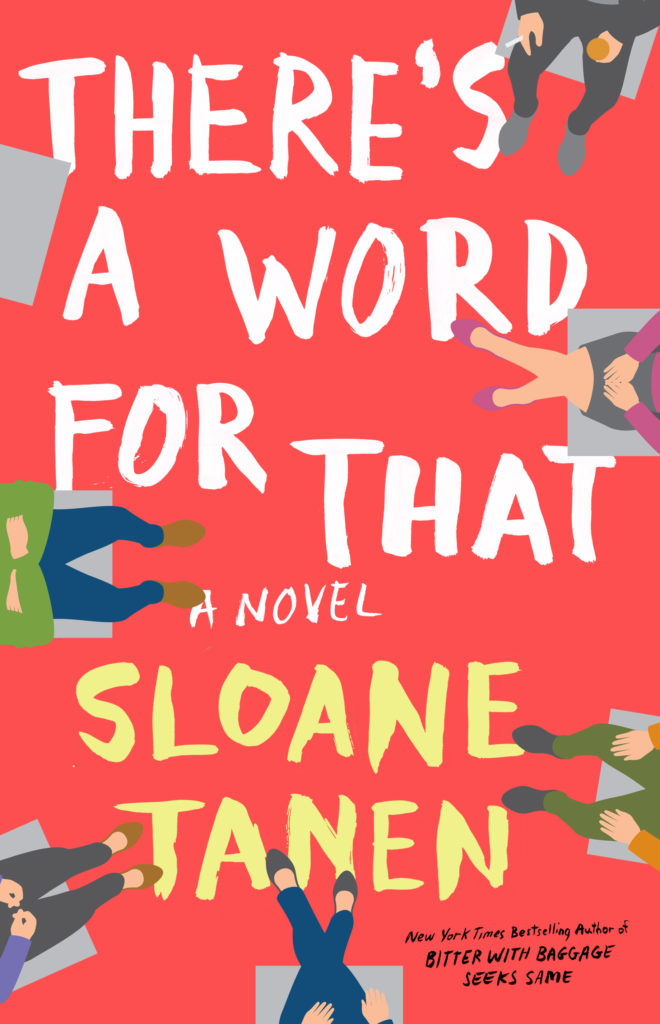There’s A Word For That
 Buy the Book:
Buy the Book:Amazon
Barnes & Noble
IndieBound
Book-A-Million
iBooks
Series: Novel
Published by: Little, Brown and Company
Release Date: April 2, 2019
Pages: 384
ISBN13: 978-0316437165
Synopsis
Meet Marty Kessler, a retired film producer whose self-worth has been eroded by age and a late-in-life passion for opiods; his daughter Janine, former childhood star suffering the aftereffects of a life in the public eye; and his granddaughter Hailey, the “less-than” twin sister, whose inferiority complex takes a most unexpected turn. Nearly six-thousand miles away, in London, celebrated author Bunny Small, Marty’s long-forgotten first wife, has her own problems: a “preposterous” case of writer’s block, a monstrous drinking habit, and a son who has fled halfway around the world to escape her.
When Marty's pill-popping gets out of hand, and Bunny's drinking reaches crisis proportions, a perfect storm of dysfunction brings them all together at Directions, Malibu’s most exclusive and absurd rehab center. The stage for this family reunion is set; now all they have to do is convince the people who seemingly know them best that they have no idea who they are.
With warmth, humor, and deep insight, There’s A Word For That is a comic ode to surviving the people closest to us, navigating the perils of success, and taking one last look in the rearview mirror before mapping out the road ahead.
Add on GoodreadsPraise
"Tanen's Are You Going to Kiss Me Now? first novel for adults follows a YA title and a hilarious series of illustrated books featuring yellow chicks. Though her delightful sense of humor infuses the plot and dialogue with sparkle, the characters and their predicaments are not played for laughs, or not only for laughs—along with the farcical situations come moments of real emotion and insight... As the characters weather tough times and deal with hurts old and new, love and humor light the way. Full of intelligence and charm."
—Kirkus, starred review
Backstory
My favorite novels are often about families falling apart; The Forsyte Saga, for instance, The Corrections, The Patrick Melrose Novels and The Middlesteins. Nobody, not even the most enviable families, can escape fate. As a reader, I’m fascinated by watching characters navigate the collapse of their tiny empires. Maybe I find it a relief that other people’s families are more dysfunctional than my own, or maybe it’s just fun to escape.
When I set out to write There’s A Word For That, my goal was to write a comedic version of the dysfunctional family drama—a story about one family facing their own dissolution. Having lived in Manhattan since my college years, I’d initially assumed I would write a New York novel. I quickly realized though, that my childhood home--Los Angeles, Hollywood in particular--, was the right place for me to explore these themes and ideas. Where else is the fall from grace so public, the shame so mercilessly exploited?
While There’s A Word For That is by no means a Hollywood novel, I did grow up very much at the center of that world and had had a front row seat to the rise and fall of so many personalities. I’d witnessed how people handled being snubbed after growing accustomed to being entitled, how they reacted to no longer getting the “good” table at a favorite restaurant, how they dealt with losing their beauty or how they reconciled their desire for privacy against their fear of slipping into obscurity.
With all these ideas in mind, I imagined my own novel as a solar system of family members, all orbiting around Marty Kessler, the family patriarch, almost as surprised as his dependent family to find himself old, diminished and on lock-down at a high end drug rehab in Malibu. And while Marty is the catalyst for this unwelcome family reunion, this is really a story about the women in his life; foremost his daughter Janine, a scarcely functioning adult who must come to terms not only with her estranged sister, Amanda, but with Marty’s secret first wife, Bunny, a character so imposing, her unexpected arrival in their lives will forever change the course.
Certainly there is an irony in anyone, let alone this cast of washed-up, broken characters coming to Los Angeles to heal, but something about it felt just right. All of us, eventually, fall apart. Having these characters, in this place, dealing with these circumstances, felt like a gift. It allowed me to inflate the experience of living beyond our potential and to make humorous what is fundamentally so painful.
Excerpt